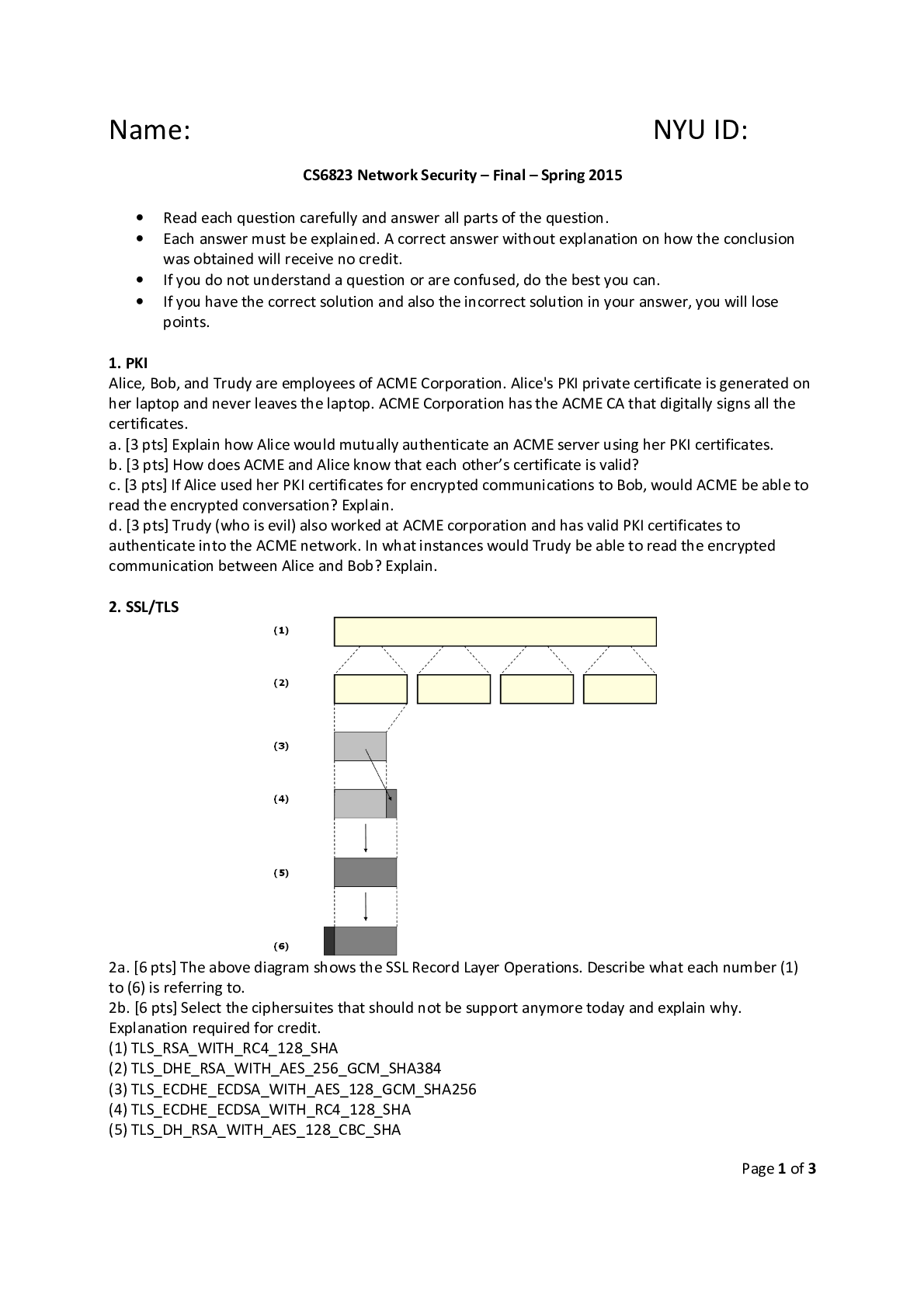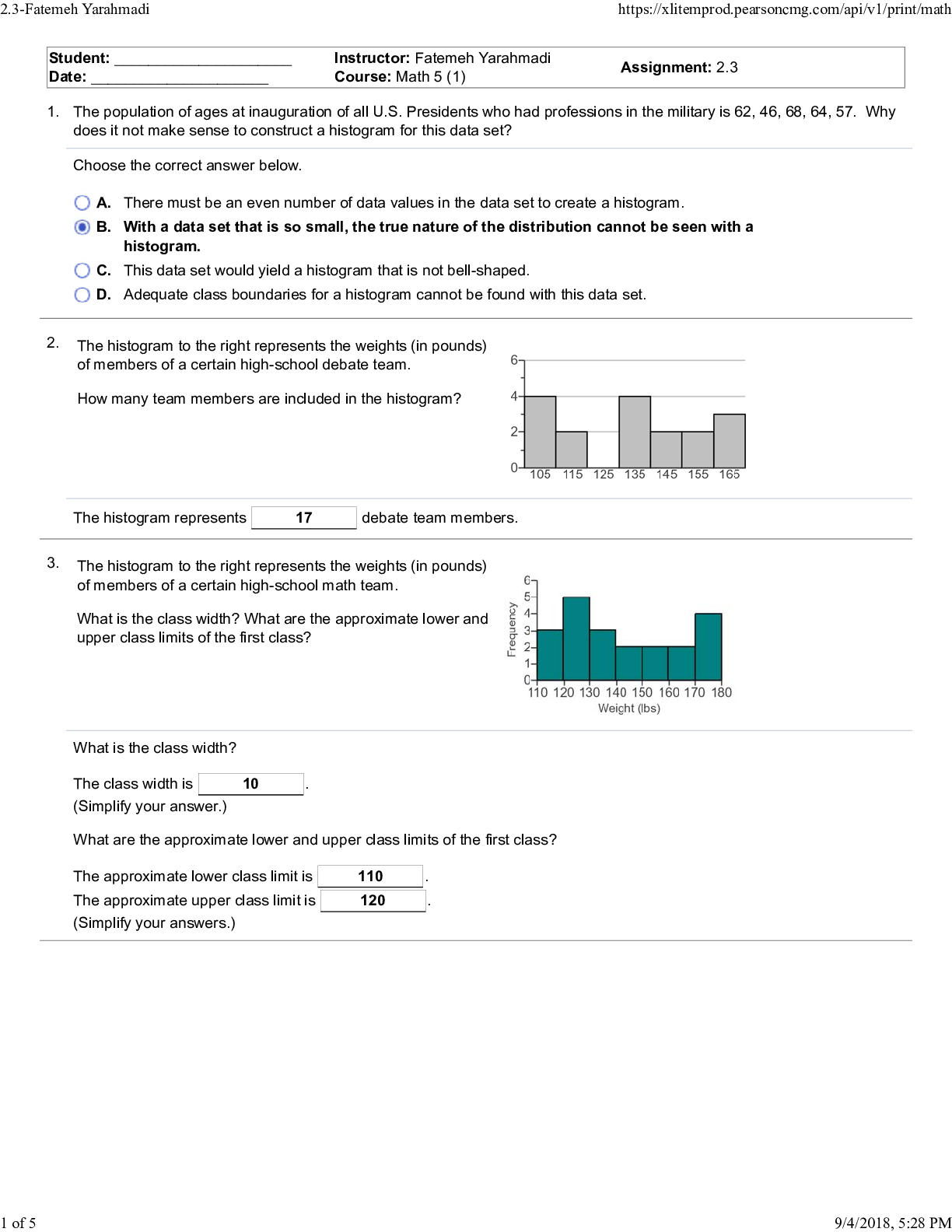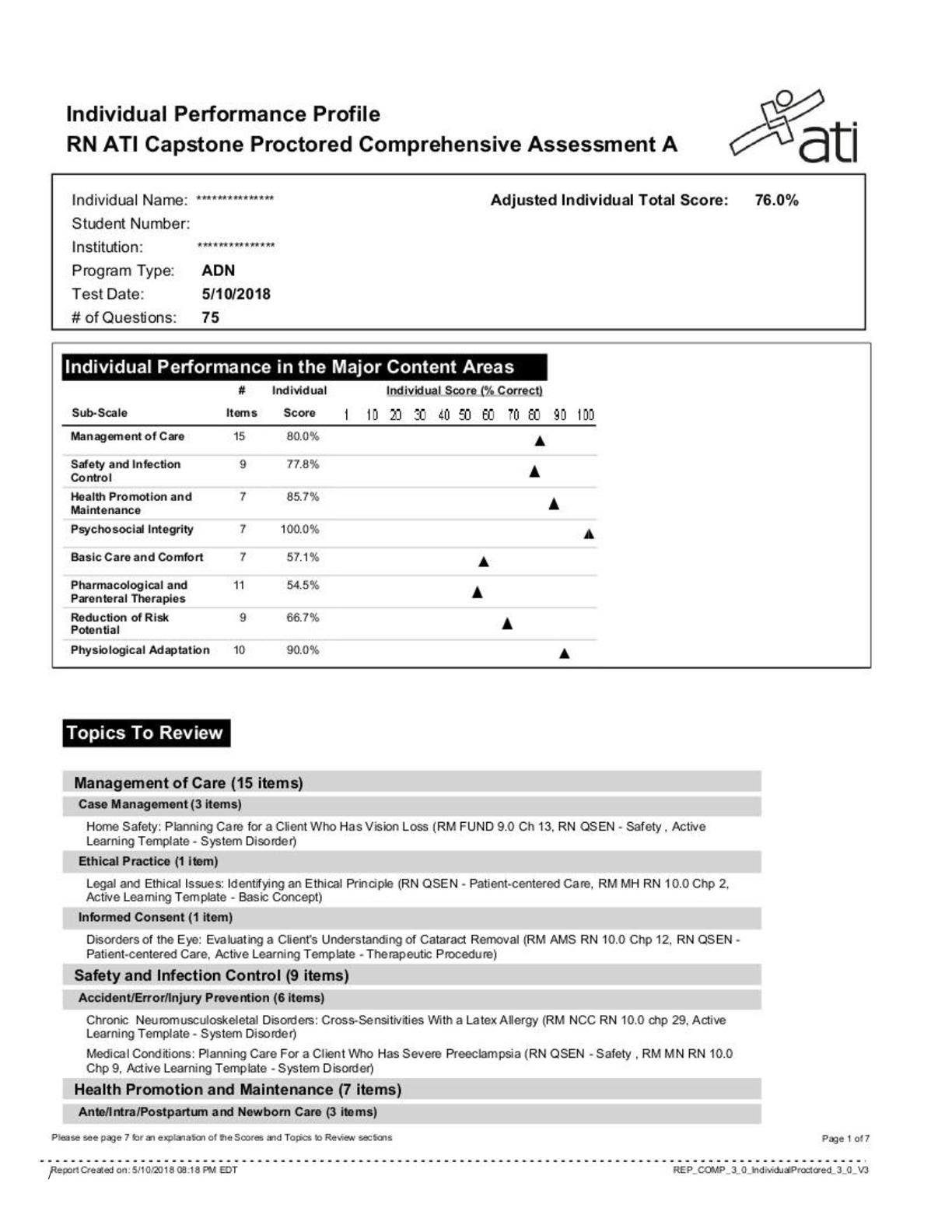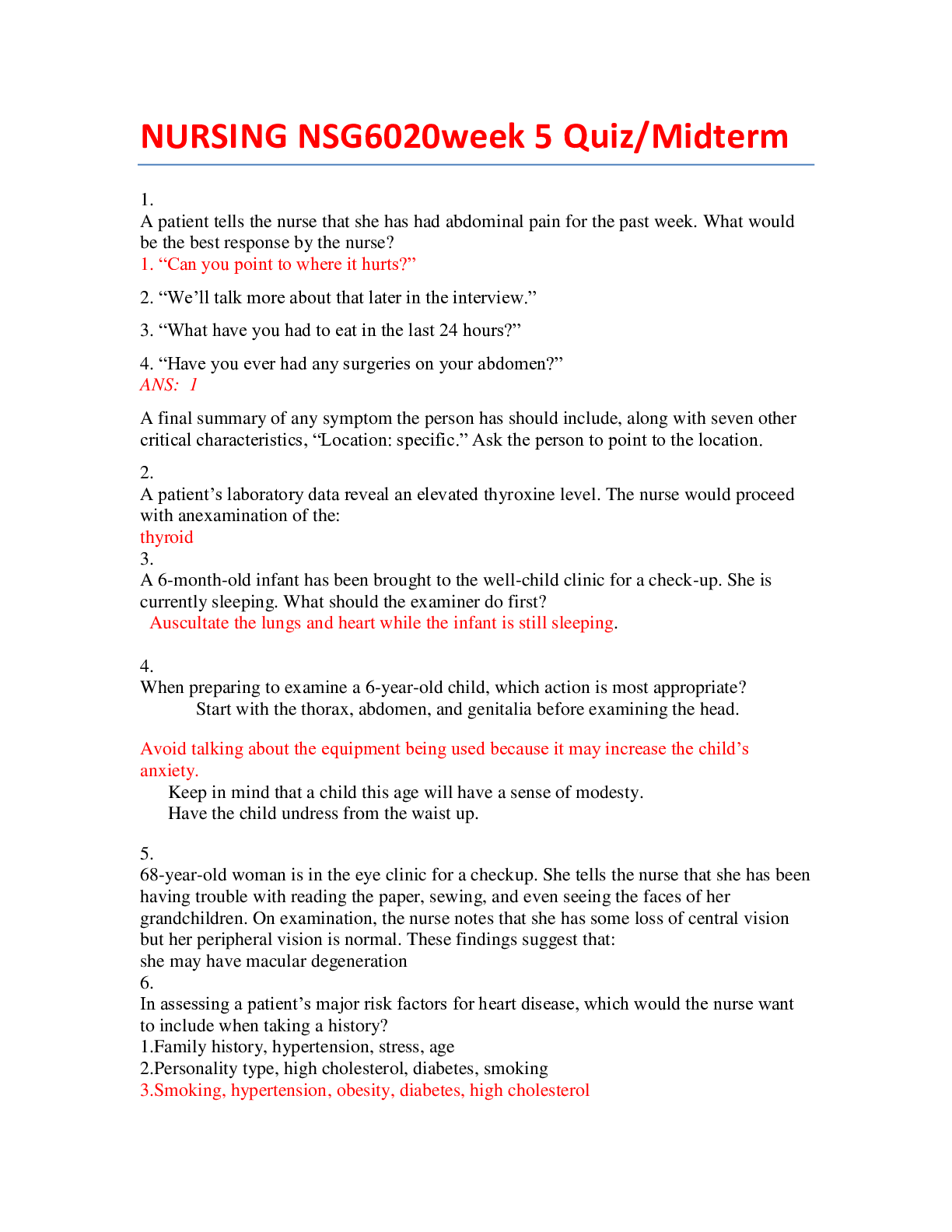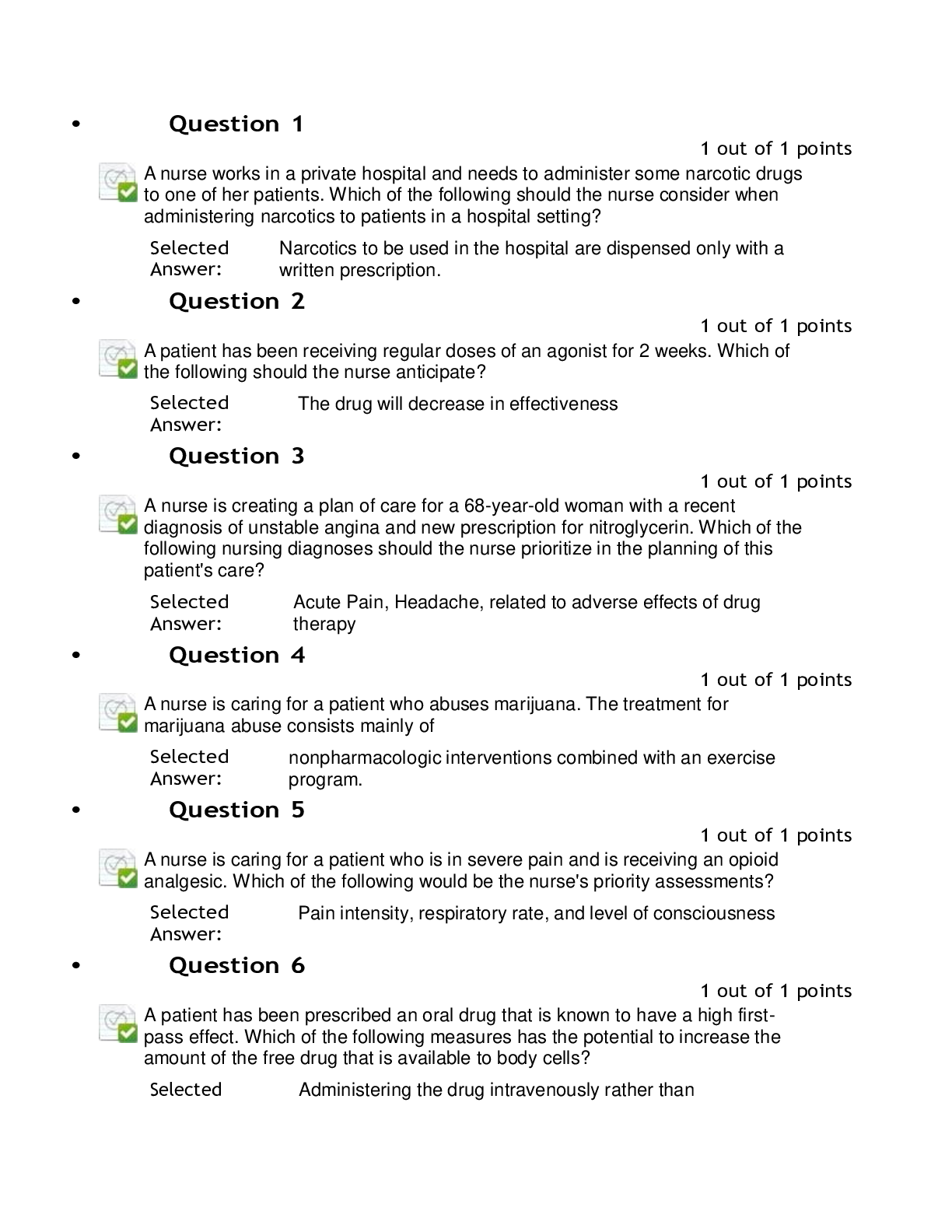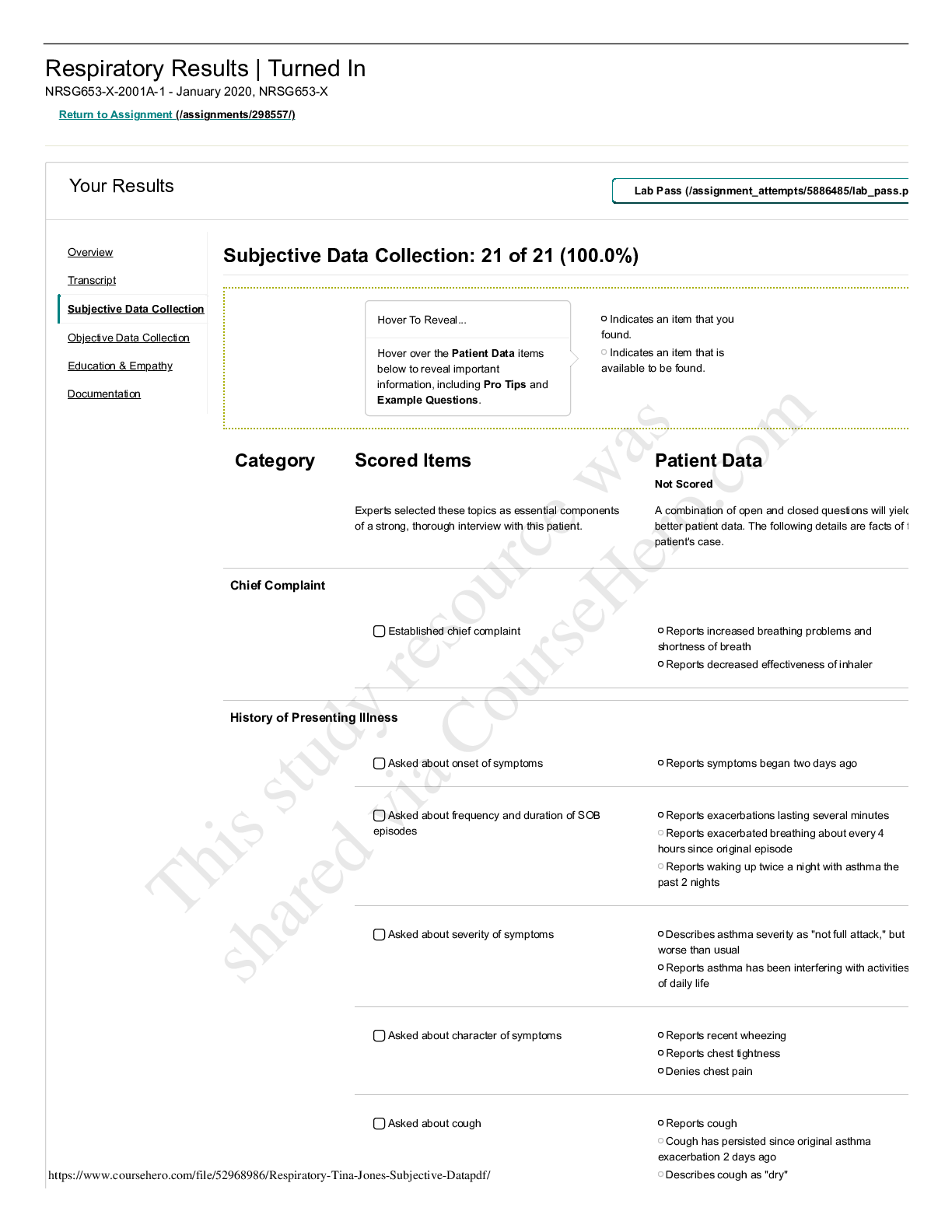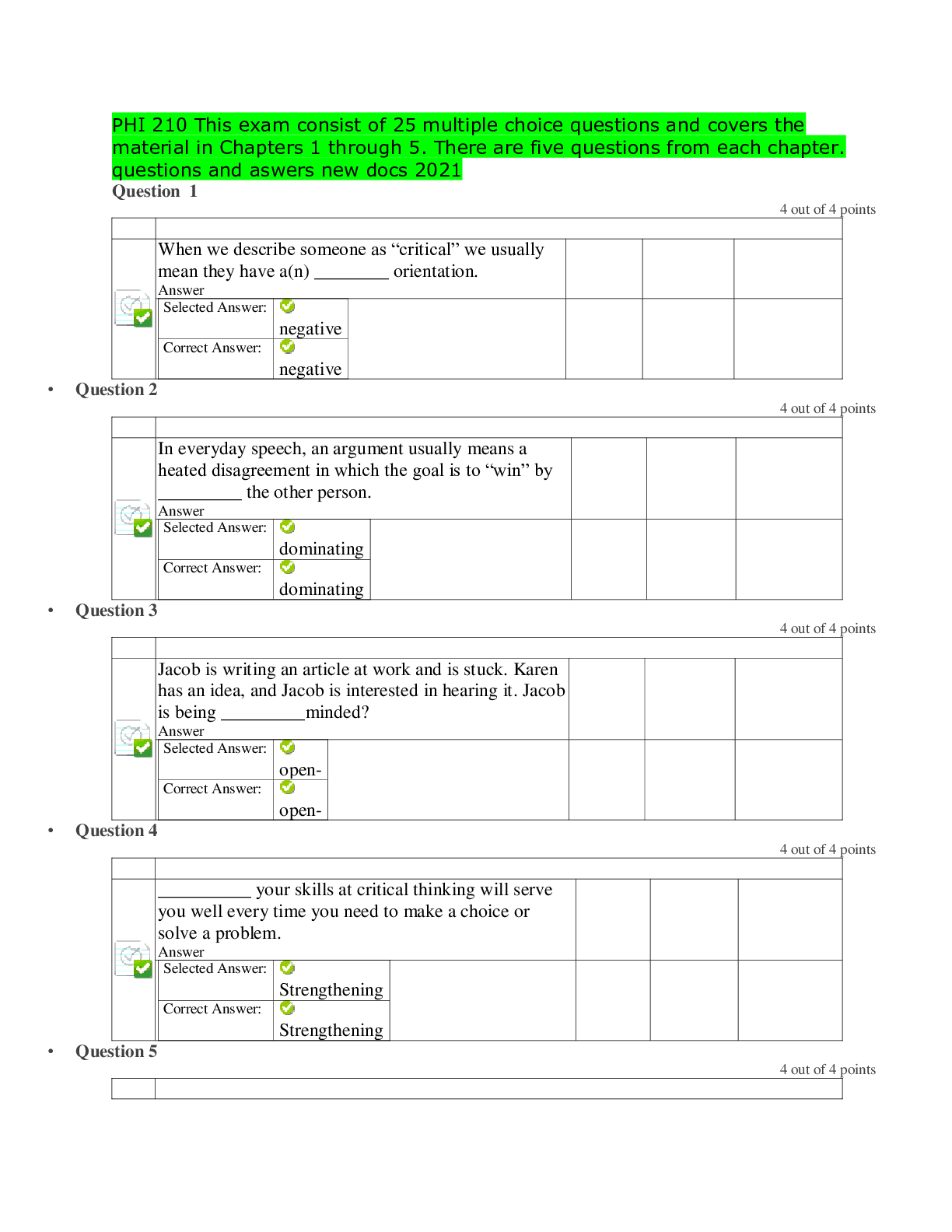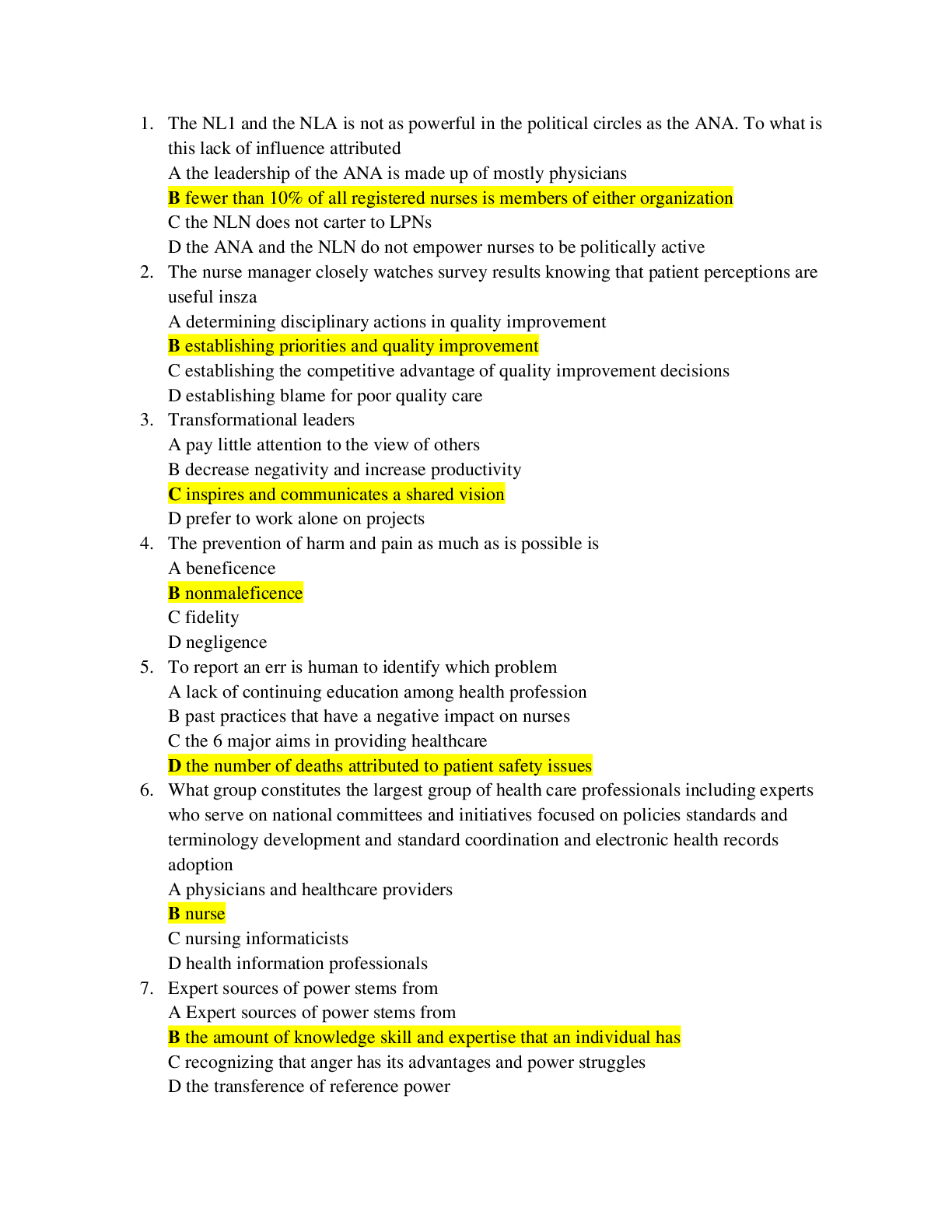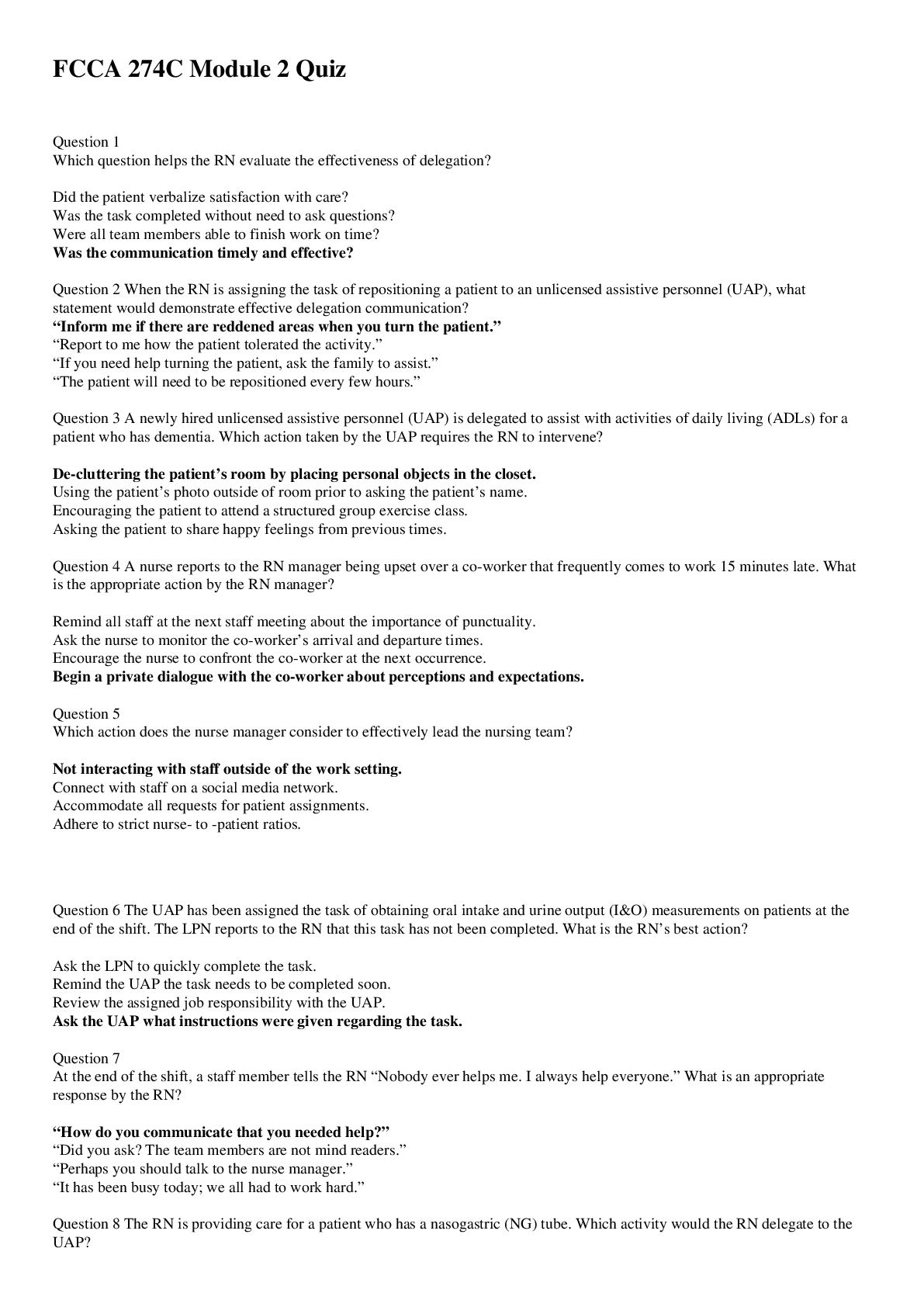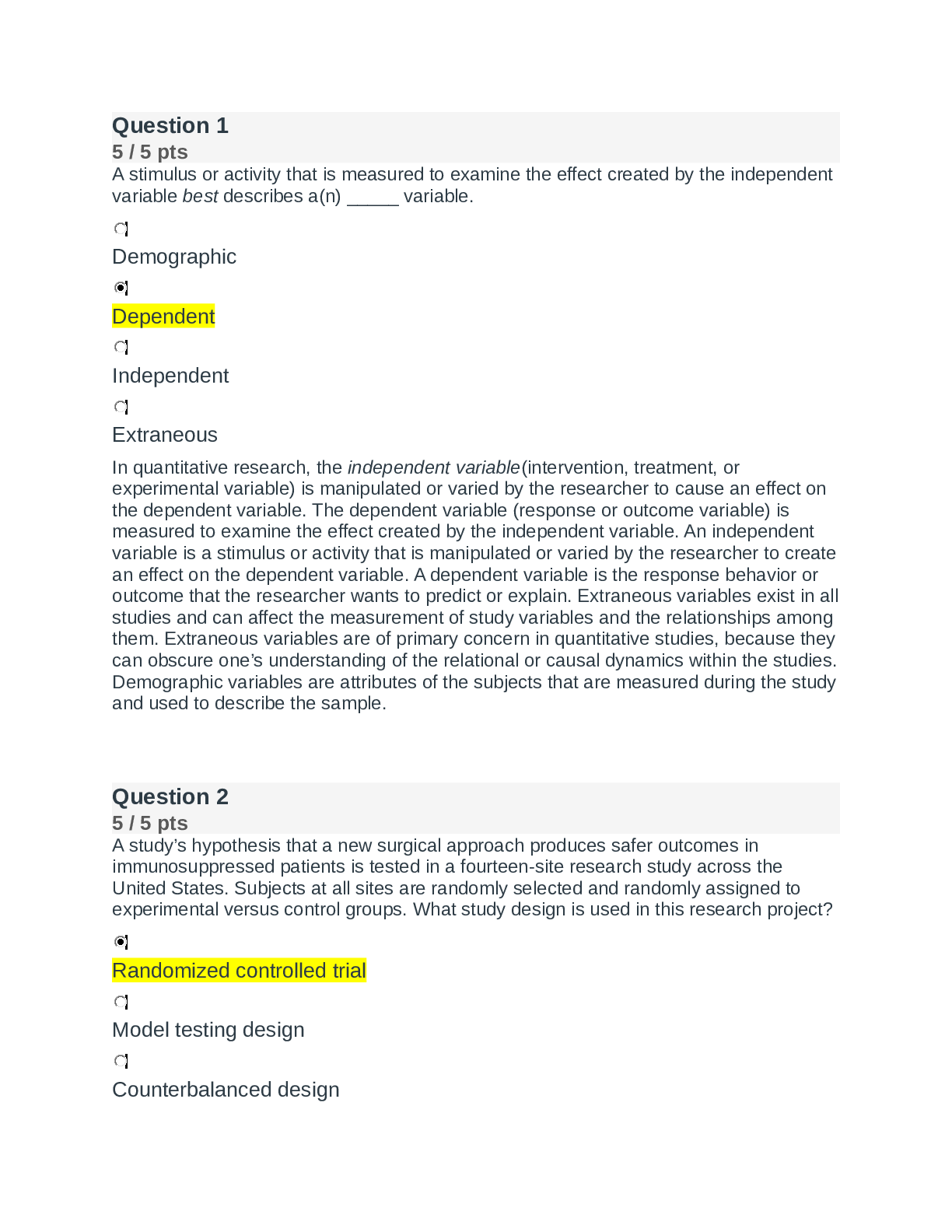HIST 141. Module 2 Quiz. Scored 90%.
Document Content and Description Below
HIST 141 Quiz Submissions - Module 2 Quiz Attempt 1 Written: Nov 5, 2020 2:28 PM - Nov 5, 2020 8:40 PM Submission View Your quiz has been submitted successfully. 2 / 2 points The Greeks became ... literate again during the ninth century BCE by adopting: Question options: 1) cuneiform script from the Assyrians. 2) Egyptian hieroglyphics. 3) the Phoenician alphabet. 4) the Hebrew alphabet. In Athens, women and slaves were completely excluded from political life. Question options: 1) True 2) False Since every polis needed hoplites, Question options: 1) production increased dramatically.2) more athletic contests and public spectacles were required. 3) poleis were forced to grant more political power to them. 4) farmers suffered losses at their expense. The Iliad and the Odyssey: Question options: 1) are epic poems with no foundation in historical events. 2) provide evidence about early Archaic Greece. 3) were composed in the Classical Period but were based on older, oral sources. 4) are the first examples of epic poetry from the ancient world. The Greek polis was: Question options: 1) a political unit centered on a city and including the surrounding lands. 2) a well-armed militia of all adult men aged 21-60. 3) a central marketplace close to the harbor. 4) a protected area around the temple. A Greek aristocrat who seized power and ruled outside the traditional constitutional framework was called a: Question options:1) monarch. 2) demagogue. 3) hoplite. 4) tyrant. According to Greeks from outside of Sparta, free Spartan women were much less restricted than women elsewhere in Greece. Question options: 1) True 2) False Each year, in order to maintain order, the Spartans did which of the following? Question options: 1) Declared war on the helots 2) Sacrificed the oldest citizens in a religious ritual 3) Invaded a neighboring polis 4) Destroyed their temples In the final stages of the Peloponnesian War, Sparta allied with Persia. Question options: 1) True 2) FalseThe Delian League, a maritime union organized to defend the Aegean against Persia, soon became the ___________ Empire. Question options: 1) Spartan 2) Egyptian 3) Athenian 4) Miletus Unlike other rulers, Cyrus of Persia (559-529 BCE): Question options: 1) took the Hebrew people into captivity in his capital city. 2) granted self-rule and religious freedom to conquered peoples. 3) granted self-rule to conquered peoples who accepted the Persian religion. 4) lost a great empire to the barbarian tribes of Central Asia. Which of the following was not an advantage for Athens in the war with Sparta? Question options: 1) the best land army in Greece 2) long walls protecting harbor and city 3) naval control of the Aegean4) wealth and supplies from sea-borne trade The decisive Greek military victory over the Persians at Salamis was won by the: Question options: 1) Spartan phalanx. 2) Greek hoplites. 3) Athenian fleet. 4) diplomatic efforts of Themistocles. During the Persian invasion of Greece in 480 b.c.e., Themistocles persuaded his fellow Athenians to: Question options: 1) rely on the Spartans for their defense. 2) abandon the city of Athens and let the Persians burn it. 3) invade and attack Persian settlements deep within Anatolia. 4) abandon naval defensive schemes and rely on ground-based forces. In 371 BCE the polis of Thebes defeated the Spartans three times in open battle. Question options: 1) True 2) FalseThe accomplishments of King Darius of Persia included: Question options: 1) extending Persian rule over Greece and the Aegean. 2) recruiting foreign mercenaries for his armies. 3) capturing the bandits that had terrorized Persepolis. 4) building roads for transport and postal service. The founding figure of Greek history-writing was Question options: 1) Herodotus 2) Zeno 3) Plato 4) Socrates ___________ wrote a history of the Peloponnesian War that remains the single most significant account of the war to this day. Question options: 1) Plato 2) Thucydides 3) Aristotle4) Herodotus Legal power over a woman passed from the father to the husband, and in cases of divorce it passed back to the father. Question options: 1) True 2) False Slaves in ancient Greece could legally be killed, raped, or maimed by their masters, if they saw fit. Question options: 1) True 2) False Plato founded a school, __________, in Athens, which remained in existence until the early Middle Ages. Question options: 1) the Academy 2) the Labyrinth 3) the Lyceum 4) the Agora In Plato's work The Republic he wrote of an imaginary polis in which political leaders were raised from childhood to become Question options:1) philosopher- kings. 2) tyrants. 3) hoplites. 4) strategos. The fundamental concept of Greek thought, as reflected in drama, literature, and philosophy, was Question options: 1) beauty 2) pleasure 3) humanism 4) equality According to Stoicism, evil does not exist. Question options: 1) True 2) False Cynics advocated: Question options: 1) conforming to social mores. 2) conservative values associated with civic virtue. 3) active engagement in politics.4) a combination of asceticism and naturalism. Within a year of his death, Alexander's empire plunged into Civil War. Question options: 1) True 2) False Alexander the Great founded a great empire that might be described as a: Question options: 1) cultural empire. 2) hereditary empire. 3) political empire. 4) scientific empire. After Alexander seized and looted Persepolis, burning it to the ground, he: Question options: 1) executed the Persian King Darius III. 2) established the site as the capital of his empire. 3) arranged for thousands of his Greek and Macedonian officers to marry Persian noblewomen. 4) sent his army back to Macedonia.Macedonian rule in Egypt was characterized by: Question options: 1) a revival of ancient traditions associated with the pharaohs. 2) social welfare policies designed to improve the lot of the poor. 3) commercial isolation. 4) ethnic assimilation between Greeks and Egyptians. The most important cultural center in the Hellenistic world was: Question options: 1) Jerusalem. 2) Memphis. 3) Alexandria. 4) Athens. 52 / 60 - 86.67 % 52 / 60 - 86.67 [Show More]
Last updated: 1 year ago
Preview 1 out of 10 pages
Instant download
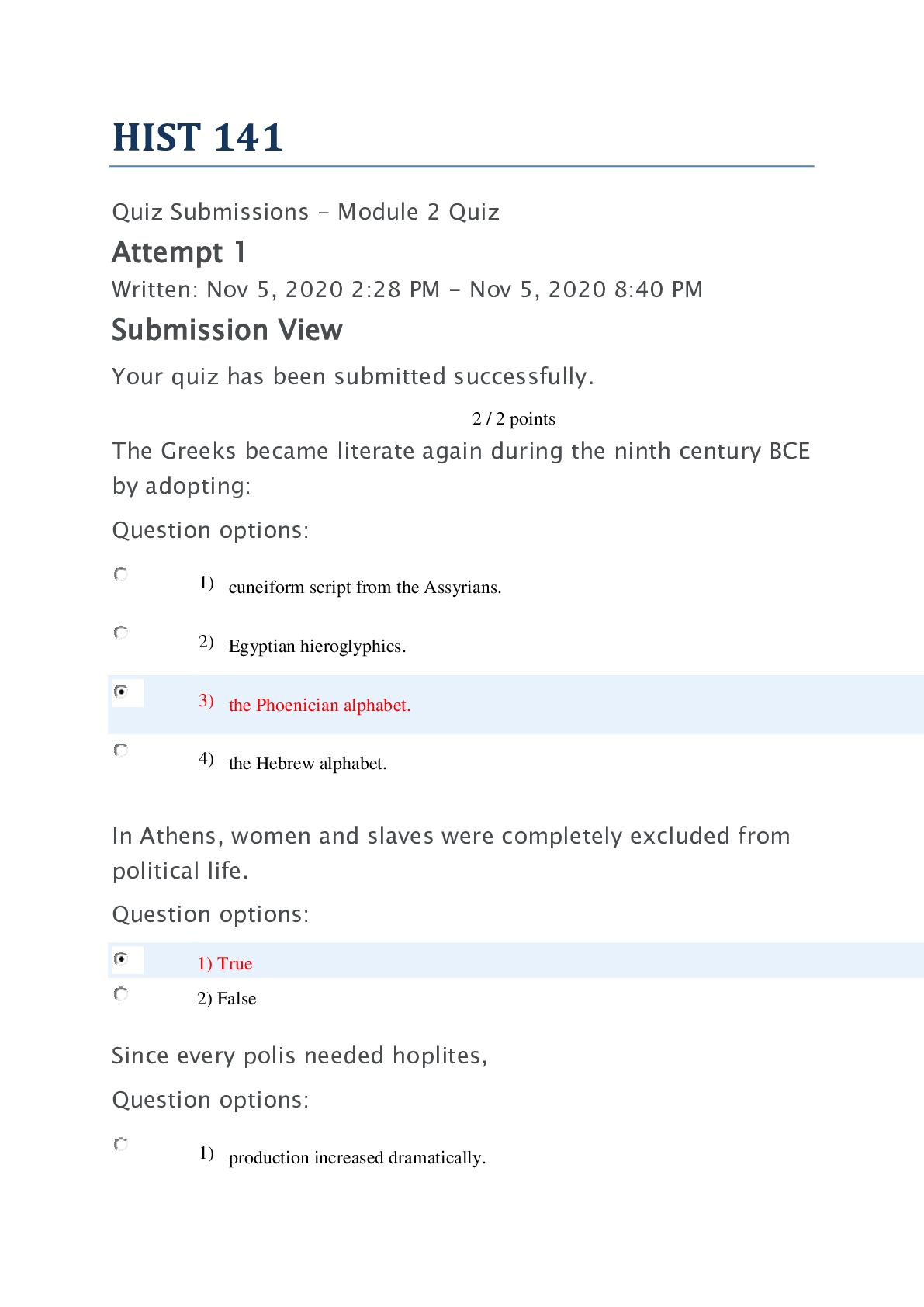
Buy this document to get the full access instantly
Instant Download Access after purchase
Add to cartInstant download
Reviews( 0 )
Document information
Connected school, study & course
About the document
Uploaded On
Nov 06, 2020
Number of pages
10
Written in
Additional information
This document has been written for:
Uploaded
Nov 06, 2020
Downloads
0
Views
33

